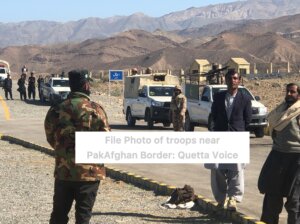Editorial:
The resurgence of polio in Balochistan, with the latest case reported from Killa Abdullah district, is a critical wake-up call for both policymakers and the public. A 24-month-old child contracting the crippling virus has shattered the province’s two-year polio-free status, raising alarm bells across the region. Health officials had already warned of the presence of environmental samples indicating the virus’s presence in various districts, yet these warnings seemingly went unheeded.
Historically, Balochistan has been a hotspot for polio, particularly in the districts of Killa Abdullah, Quetta, Pishin, and Chaman. The recurrence of cases in these areas points to systemic failures within government departments tasked with eradicating the virus. It also reflects the inefficacy of international donors’ efforts, which, despite their good intentions, have not produced the desired outcomes.
A significant part of the problem lies in the outdated strategies still being employed. It’s clear that these old methods are no longer effective. What is needed is a fresh, indigenous strategy tailored to the unique challenges of Balochistan. This strategy should focus on innovative and context-specific solutions rather than relying on the same approaches that have repeatedly failed.
EOC Position Must Be On Merit
The dedication of polio volunteers, police, levies, and frontier corps personnel, who have sacrificed their lives to protect children from the virus, is commendable. Their commitment underscores the importance of having equally dedicated leadership. Unfortunately, for over two weeks, the critical position of Chief of the Emergency Operation Cell (EOC) has been vacant. This role is vital in coordinating and leading polio eradication efforts, and its vacancy at such a crucial time is unacceptable.
The EOC Chief’s position must be filled immediately with a competent and dedicated individual. This is not the time for nepotism or favoritism; the lives of thousands of children are at stake. The appointment should be based on merit and commitment to the cause, not on political connections or personal favoritism.
Moreover, there needs to be greater accountability and transparency within the government departments responsible for health. The failure to address the resurgence of polio effectively suggests a lack of proper oversight and management. International donors and local authorities must work together more cohesively, ensuring that funds are utilized effectively and that there is a clear strategy in place.
Polio A Matter Of National Importance
Polio eradication is not just a health issue; it is a matter of national importance. The resurgence of this virus in Balochistan threatens to undermine years of progress and poses a significant risk to the broader region. It is imperative that immediate, decisive action is taken to address this alarming situation.
In conclusion, the rising polio cases in Balochistan are a stark reminder of the ongoing challenges in public health management. Filling the EOC Chief’s position with a qualified and dedicated individual is a critical first step. It’s time for policymakers to wake up to the urgency of the situation and for the government to implement a robust, innovative strategy to finally rid Balochistan of this devastating virus. The future health of thousands of children depends on it.






